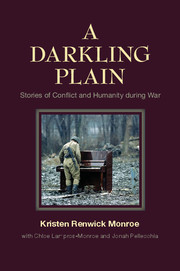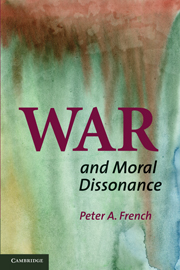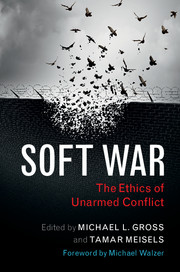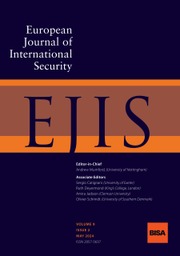A Darkling Plain
How do people maintain their humanity during wars? Despite its importance, this question receives scant scholarly attention, perhaps because war is overwhelming. The generally accepted belief is that wars bring out the worst in us, pitting one against another. 'War is hell', William Tecumseh Sherman famously noted, and even 'just' wars are massively destructive and inhumane. Since ethics is concerned with discovering what takes us to a morally superior place, one conducive to betterment and happiness - studying what helps people survive wartime trauma thus becomes an extremely valuable enterprise. A Darkling Plain fills an important scholarly void, analyzing wartime stories that reveal much about our capacity to process trauma, heal wounds, reclaim lost spirits, and derive meaning and purpose from the most horrific of personal events.
- Innovative use (in academic publishing) of narrative data to tell stories of how people keep humanity intact during wartime
Reviews & endorsements
"A Darkling Plain: Stories of Conflict and Humanity during War provides a fresh interdisciplinary perspective to address an important understudied studied topic: how do individuals maintain their humanity in war and its aftermath? This is one of those rare non-fiction books that is hard to put aside once you start reading it. In spite of the harrowing nature of the wartime stories of suffering that are described in first-person accounts, this material is also rich in conveying courage, emotional connectedness, and personal growth and healing. Moreover, A Darkling Plain uses these poignant interviews as well as drawing from others to test a variety of theories about resilience in the face of suffering - theories ranging from the situational/environmental, to the existential/psychoanalytic, and to the literature on post-traumatic stress disorder. There is much in A Darkling Plain to stimulate further thinking and insight about this understudied topic of resilience and humanity in war."
Cheryl Koopman, Stanford University
"Making the unconscious conscious, giving voice to the unspeakable, Kristen Monroe makes intimate the horrors of war, persecution, and genocide. From Armenia to the Holocaust, from Iwo Jima to the Japanese internment camps in the United States, memories of resilience and despair are restored to the sleeping world. Monroe has collected the voices that, as in Joyce’s aspiration, "forge the uncreated conscience of [our time]"."
Robert E. Lane, Emeritus Professor, Yale University, Connecticut
"A Darkling Plain presents a timely and deeply affecting series of narrative interviews with individuals who not only survived, but eventually thrived, in the wake of horrific experiences in war, ranging from the Armenian genocide through World War II to current conflicts in Iraq and Afghanistan. These survivors demonstrate how acceptance of our interconnectedness and humility in the face of horror can allow hope and humanity to exist side by side in the face of hate and destruction. Monroe’s magisterial work synthesizing the lessons their experiences glean provides insight into the factors that help promote both resilience and recovery in face of trauma and torture."
Rose McDermott, Brown University
"With her characteristic wisdom, empathy, and superb interviewing skills, Kristen Monroe has written a book that everyone connected with wars should read. She has an unusual talent for identifying questions as difficult as they are important, and the book provides not the answer - which is not possible - but many answers that resonate widely and deeply. This is a moving and provocative book."
Jennifer L. Hochschild, Henry LaBarre Jayne Professor of Government and Professor of African and African American Studies, Harvard University
Product details
October 2014Paperback
9781107690172
321 pages
228 × 153 × 15 mm
0.45kg
Available
Table of Contents
- Part I:
- 1. War is hell. War is all hell. Scholarly literature on the unspeakable: literature, methodology, and data
- Part II. War and Humanity in World War II:
- 2. If something's going to get you, it'll get you. Frank, American solider in the South Pacific
- 3. Prejudice, bigotry, and hatred. Love and luck. Laura, Holocaust survivor on Schindler's list
- 4. Everything went downhill after that. Gunther, refugee and displaced person with an SS father
- 5. In the middle of the hailstorm, one doesn't fear for one's own life. The red princess and the July 20 Plot to kill Hitler
- 6. Belonging to something. Herb, Austrian Jewish refugee from the Third Reich
- 7. Hard to adjust after all that. Grace, interned Japanese American teenager
- Part III. Other Voices, Other Wars: From Indochina to Iraq:
- 8. Best forget about Vietnam. Christopher, Vietnam
- 9. For my family. Tuan, South Vietnam
- 10. Bad memory, bad feeling. Sara on the Khmer Rouge
- 11. Someone loving me. Kimberly on the Khmer Rouge
- 12. Collateral damage and the greater good. Doc and the Iraq War
- 13. Easily the worst experience of my life. Sebastian on the Iraq War
- Part IV. Civil Wars and Genocides, Dictators and Domestic Oppressors:
- 14. Grandfather had his head cut off. Rose and the Armenian genocide
- 15. A resistance to keep you alive. Ngũgĩ on the Mau Mau, anti-colonialism, and homegrown dictators
- 16. Stuck in the mud in the middle of a civil war. Fabiola on the Nicaraguan Civil War
- 17. Too much was seen. Marie on the Lebanese Civil War
- 18. Care about other people. Okello and Idi Amin's Uganda
- 19. People suffered great loss. Reza and Afghanistan under the Soviets
- 20. Religion mixed with politics creates bad things. Leyla and the Islamic Republic of Iran
- Part V. Guarding One's Humanity during Wars and Genocide:
- 21. The fundamental things apply
- Conclusion: the enormity of it all.









